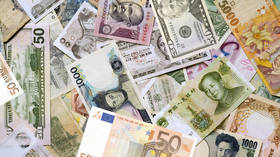Argentina drops dollar in trade with China
Buenos Aires will pay for imports in yuan, after signing a currency swap deal with Beijing
Argentina will aim to pay for the bulk of its monthly imports from China in yuan rather than US dollars, Economy Minister Sergio Massa announced on Wednesday. Buenos Aires and Beijing signed a currency swap agreement last year, aimed at stemming the outflow of foreign currency from Argentina’s central bank.
China is currently Argentina’s second largest trade partner after Brazil, and the second biggest destination for Argentinian exports. Argentina’s total imports from China was around $13.5bn in 2021, according to the United Nations database on international trade.
Massa said that Buenos Aires will pay the equivalent of $1 billion in yuan for Chinese goods and services this month, with $790 million of monthly imports paid for in yuan each month thereafter. The currency swap agreement, expanded and finalized earlier this year, also allows Argentinian exporters to make settlements in yuan or dollars, to help balance the flows of foreign currencies in the central bank.
On a visit to China earlier this month, Brazilian President Luiz Inacio Lula da Silva called on developing nations to move away from the US dollar in favor of their own currencies. India is also working to use its own currency or yuan to settle trade with China, while Russia started to accept payments for its exports from a number of countries in rubles and Chinese yuan.
The dollar’s share in global reserves fell ten times faster last year than over the past two decades, the CEO of London-based asset management company Eurizon, Stephen Jen, recently told Bloomberg. The process has accelerated after other countries saw Russia’s US dollar and Euro-denominated assets frozen abroad and Moscow cut off from the global financial messaging system known as SWIFT.
US Secretary of the Treasury Janet Yellen recently admitted that the role of the dollar as the world reserve currency could diminish due to Washington using its leverage over the global financial system to pursue its geopolitical goals through sanctions.
You can share this story on social media:








Comments are closed.